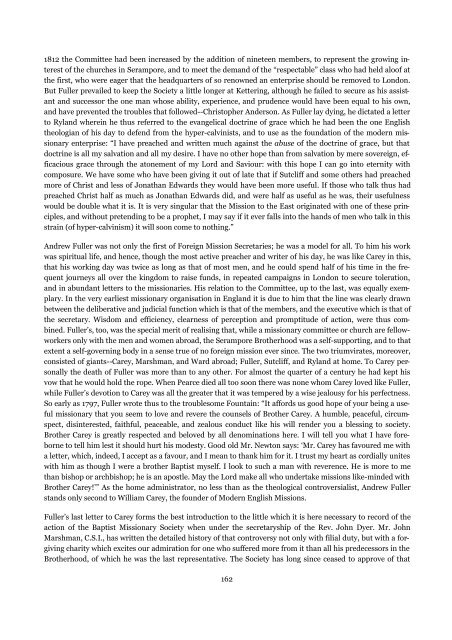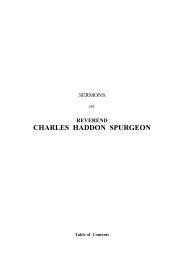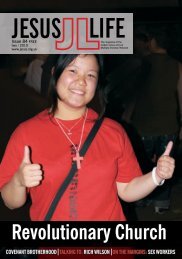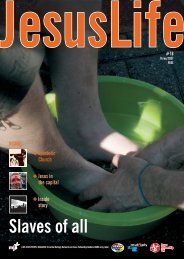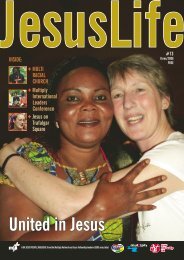Life of William Carey by George Smith - The Jesus Army
Life of William Carey by George Smith - The Jesus Army
Life of William Carey by George Smith - The Jesus Army
Create successful ePaper yourself
Turn your PDF publications into a flip-book with our unique Google optimized e-Paper software.
1812 the Committee had been increased <strong>by</strong> the addition <strong>of</strong> nineteen members, to represent the growing interest<br />
<strong>of</strong> the churches in Serampore, and to meet the demand <strong>of</strong> the “respectable” class who had held alo<strong>of</strong> at<br />
the first, who were eager that the headquarters <strong>of</strong> so renowned an enterprise should be removed to London.<br />
But Fuller prevailed to keep the Society a little longer at Kettering, although he failed to secure as his assistant<br />
and successor the one man whose ability, experience, and prudence would have been equal to his own,<br />
and have prevented the troubles that followed--Christopher Anderson. As Fuller lay dying, he dictated a letter<br />
to Ryland wherein he thus referred to the evangelical doctrine <strong>of</strong> grace which he had been the one English<br />
theologian <strong>of</strong> his day to defend from the hyper-calvinists, and to use as the foundation <strong>of</strong> the modern missionary<br />
enterprise: “I have preached and written much against the abuse <strong>of</strong> the doctrine <strong>of</strong> grace, but that<br />
doctrine is all my salvation and all my desire. I have no other hope than from salvation <strong>by</strong> mere sovereign, efficacious<br />
grace through the atonement <strong>of</strong> my Lord and Saviour: with this hope I can go into eternity with<br />
composure. We have some who have been giving it out <strong>of</strong> late that if Sutcliff and some others had preached<br />
more <strong>of</strong> Christ and less <strong>of</strong> Jonathan Edwards they would have been more useful. If those who talk thus had<br />
preached Christ half as much as Jonathan Edwards did, and were half as useful as he was, their usefulness<br />
would be double what it is. It is very singular that the Mission to the East originated with one <strong>of</strong> these principles,<br />
and without pretending to be a prophet, I may say if it ever falls into the hands <strong>of</strong> men who talk in this<br />
strain (<strong>of</strong> hyper-calvinism) it will soon come to nothing.”<br />
Andrew Fuller was not only the first <strong>of</strong> Foreign Mission Secretaries; he was a model for all. To him his work<br />
was spiritual life, and hence, though the most active preacher and writer <strong>of</strong> his day, he was like <strong>Carey</strong> in this,<br />
that his working day was twice as long as that <strong>of</strong> most men, and he could spend half <strong>of</strong> his time in the frequent<br />
journeys all over the kingdom to raise funds, in repeated campaigns in London to secure toleration,<br />
and in abundant letters to the missionaries. His relation to the Committee, up to the last, was equally exemplary.<br />
In the very earliest missionary organisation in England it is due to him that the line was clearly drawn<br />
between the deliberative and judicial function which is that <strong>of</strong> the members, and the executive which is that <strong>of</strong><br />
the secretary. Wisdom and efficiency, clearness <strong>of</strong> perception and promptitude <strong>of</strong> action, were thus combined.<br />
Fuller’s, too, was the special merit <strong>of</strong> realising that, while a missionary committee or church are fellowworkers<br />
only with the men and women abroad, the Serampore Brotherhood was a self-supporting, and to that<br />
extent a self-governing body in a sense true <strong>of</strong> no foreign mission ever since. <strong>The</strong> two triumvirates, moreover,<br />
consisted <strong>of</strong> giants--<strong>Carey</strong>, Marshman, and Ward abroad; Fuller, Sutcliff, and Ryland at home. To <strong>Carey</strong> personally<br />
the death <strong>of</strong> Fuller was more than to any other. For almost the quarter <strong>of</strong> a century he had kept his<br />
vow that he would hold the rope. When Pearce died all too soon there was none whom <strong>Carey</strong> loved like Fuller,<br />
while Fuller’s devotion to <strong>Carey</strong> was all the greater that it was tempered <strong>by</strong> a wise jealousy for his perfectness.<br />
So early as 1797, Fuller wrote thus to the troublesome Fountain: “It affords us good hope <strong>of</strong> your being a useful<br />
missionary that you seem to love and revere the counsels <strong>of</strong> Brother <strong>Carey</strong>. A humble, peaceful, circumspect,<br />
disinterested, faithful, peaceable, and zealous conduct like his will render you a blessing to society.<br />
Brother <strong>Carey</strong> is greatly respected and beloved <strong>by</strong> all denominations here. I will tell you what I have foreborne<br />
to tell him lest it should hurt his modesty. Good old Mr. Newton says: ‘Mr. <strong>Carey</strong> has favoured me with<br />
a letter, which, indeed, I accept as a favour, and I mean to thank him for it. I trust my heart as cordially unites<br />
with him as though I were a brother Baptist myself. I look to such a man with reverence. He is more to me<br />
than bishop or archbishop; he is an apostle. May the Lord make all who undertake missions like-minded with<br />
Brother <strong>Carey</strong>!’” As the home administrator, no less than as the theological controversialist, Andrew Fuller<br />
stands only second to <strong>William</strong> <strong>Carey</strong>, the founder <strong>of</strong> Modern English Missions.<br />
Fuller’s last letter to <strong>Carey</strong> forms the best introduction to the little which it is here necessary to record <strong>of</strong> the<br />
action <strong>of</strong> the Baptist Missionary Society when under the secretaryship <strong>of</strong> the Rev. John Dyer. Mr. John<br />
Marshman, C.S.I., has written the detailed history <strong>of</strong> that controversy not only with filial duty, but with a forgiving<br />
charity which excites our admiration for one who suffered more from it than all his predecessors in the<br />
Brotherhood, <strong>of</strong> which he was the last representative. <strong>The</strong> Society has long since ceased to approve <strong>of</strong> that<br />
162


